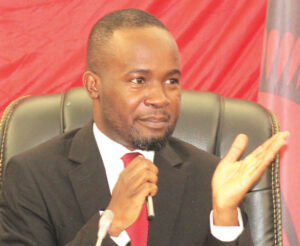By Deogratias Mmana:
The country’s public debt, which is hovering around $7.9 billion (K7.9 trillion), has alarmed stakeholders, with the Malawi Economic Justice Network (Mejn) and African Forum and Network on Debt and Development (Afcodd) calling on State and non-State actors to treat the issue with the urgency it deserves.
Afcodd represents the coming together of stakeholders, feeding into the forthcoming Afcodd, which is scheduled to take place in Dakar, Senegal, from August 1 2023.
“There is a need for honest dialogue on the issue so that the country can take its destiny into its own hands. Among other things, it has to consider all odds, in terms of what can best work for Malawi to attain Malawi (MW) 2063 development aspirations,” Mejn Executive Director Bertha Phiri said in Lilongwe Monday.
“Malawi’s economy is almost in shambles. Crippled with high public debt hovering around $7.9 billion as of December 2022, the country is struggling to service its debt, let alone allocate budgetary resources towards development.
“As if that is not enough, during every meeting of Parliament, there are Loan Authorisation bills passed left, right and centre, adding on to the debt portfolio the country is failing to manage,” Phiri added.
The African Economic Outlook for 2022 estimated that 14 million additional people were driven into extreme poverty in Africa due to higher global energy and food prices in 2022, worsening cases of extreme poverty induced by the Covid pandemic.
The International Monetary Fund (IMF) Africa Regional Economic Outlook for 2023 shows that public debt and inflation are at levels not seen in decades, with double digit inflation present in about half of the countries, therefore “eroding household purchasing power and striking at the most vulnerable”.
The IMF report also confirms a shortage of funds, which, it says, may force countries to reduce resources for critical development sectors such as health, education and infrastructure, weakening the region’s growth potential.
In 2020, the Treasury set up a Debt Retirement Fund to be used to service public debt.
However, it is yet to be operationalised.
And, just recently, the government set a debt restructuring strategy which serves as a cornerstone for restoring debt sustainability.
The government also engaged a debt adviser to support a credible process for debt restructuring based on adequate creditor engagement to ensure the approach taken delivers the necessary contributions in a sustainable manner.
The debt strategy, according to a memorandum the government issued, is designed to achieve debt sustainability and close financing gaps.
It says the strategy seeks to bring external public debt back to a moderate risk of debt distress in the medium term through a combination of policy adjustment and the necessary debt treatment.

Finance Minister Sosten Gwengwe remains upbeat that the debt sustainability plan is still intact despite the threats and that the government will stick to it.
He said in a recent interview that, after dealing with the effects of Tropical Cyclone Freddy, the government will, however, re-strategise on the debt plan.
“Having sustainable debt is key to this government and spending prudently will not stop despite facing numerous challenges. Therefore, I can assure Malawians that the debt sustainability plan is still intact,” Gwengwe said.
A recent study by the Economics Association of Malawi, Lilongwe University of Agriculture and Natural Resources and Ofxam revealed that the huge public debt over the past years has not significantly impacted development on the ground.
Malawi is gradually surpassing the pre-Heavily Indebted Poor Countries and Multilateral Debt Relief Initiative state when, in 2006, it got relieved of its external debt.
Meanwhile, chairperson for the task team that has organised a two-day conference, which started yesterday, on the debt issue, Leon Matanda, has said they have economic experts including Secretary to the Treasury, the academia, civil society organisations, faith leaders and others.
Matanda said some of the issues to be discussed include how public debt is affecting the implementation of MW2063, debt and climate change financing and conditions attached to debt and what Malawi uses debt for and the roles played by several sectors in public debt management.








